
Do So-Called Feel-Good Sitcoms Actually Just Make Us Feel Worse About Ourselves?
There’s something deceptively warm about returning to your favorite sitcom.
The familiar theme song plays. The gang is back at their usual table, couch, or bar. The jokes are easy. The pacing is predictable. And beneath it all is the quiet, unspoken promise that life might be hard, but it all works out in the end. We grew up watching Friends, How I Met Your Mother, New Girl, and The Office, believing in that promise.
But what happens when you reach adulthood and realize your life looks nothing like theirs? That the tight-knit friendships, sprawling apartments, and meet-cute love stories were never really attainable – at least not without a trust fund or a TV writer controlling your arc. This is the cruel optimism of sitcoms. The comforting lie is that the unending chaos of adulthood is part of its charm when, in reality, it’s often a grind with less laughter and fewer people sticking around to say, “I’ll be there for you.”
Friends

Let’s start with Friends, the godfather of millennial sitcoms. On the surface, it’s a story about six 20- somethings navigating love and careers in New York City. But scratch a little deeper, and you’ll see the show operates on a logic totally divorced from economic reality. Monica’s massive apartment is only vaguely explained by rent control and her grandmother’s lease. Rachel quits her job as a waitress and magically lands a position in fashion, one of the most competitive industries in the world, with no prior experience.
Chandler leaves his job in data analysis and somehow easily pivots to advertising. Again, no resume, experience, or portfolio required. The emotional tone is also deceptively optimistic. Life throws curveballs at everyone, but there’s always a cozy couch and sarcastic banter to soften the blow. The intended takeaway is that life may be unpredictable, but the people who matter will never leave. Sadly, that is just a fantasy. And when you’re struggling to pay rent, or when your circle of friends thins with time and geography, that fantasy begins to sting.
How I Met Your Mother

How I Met Your Mother, a sitcom about surviving your 30s, offered us a grown-up twist. The storytelling was nonlinear, the humor more ironic, and the emotions often more poignant. But the central message was still steeped in romantic idealism. Ted spends nine seasons looking for “the one,” making a series of spur-of-the-moment decisions (like stealing a blue French horn to impulsively moving) because he believes that destiny will sort everything out. Marshall and Lily, though more grounded, still live in a wildly unrealistic Brooklyn apartment on a teacher’s and a law student’s income.
In the finale, Ted ends up with Robin, the woman he repeatedly tried and failed to make it work with, despite the years of emotional closure built between them. The show treats this as a satisfying full-circle moment. But the real fantasy is that the woman who told Ted multiple times she didn’t want what he wanted suddenly becomes a viable option again once his real love is conveniently gone. What the show expects us to believe is that you can wait for love, sacrifice your 20s chasing the idea of “the one,” and still end up settling. It’s not romantic. It’s exhausting.
New Girl

When New Girl premiered, it was billed as a fresh, offbeat comedy about what happens when a bubbly teacher moves in with three strange but lovable dudes. And while it attempted to update the sitcom formula with more visible anxiety, job instability, and awkward real-world encounters, it ultimately leaned on the same tropes. Jess is constantly broke but still somehow lives in a massive loft in Los Angeles. Nick is a bartender who seems to survive entirely on vibes, but his occasional writing aspirations still magically blossom into book deals.
Schmidt’s transition from annoying to lovable romantic is fun but also conveniently ignores the kind of therapy and work such a shift would require in real life. New Girl wants to feel real by acknowledging depression, family trauma, and adult loneliness. But it still wraps everything in a pastel filter and indie soundtrack. No matter how dire things get, the gang ends up back in that loft, drinking out of red cups and playing silly games. It’s emotional comfort food, yes. But it’s still serving up a fantasy that says your real life is waiting just around the next ridiculous shenanigan.
The Office

Among this lineup, The Office feels the most realistic. Set in the fluorescent-lit purgatory of a paper company in Scranton, it acknowledges the tedium of adult work life better than most sitcoms. But even here, reality is shaped to fit an idealistic mold. In classic sitcom style, Jim and Pam’s romance takes a really long time to get off the ground, but they still manage to buy a house, start a family, and experiment with big career moves, all without ever dealing with the economic pressures most couples face.
Michael Scott, a deeply inappropriate boss, is slowly reframed as an endearing fool rather than the kind of person HR nightmares are made of. And Dwight, once the office oddball, becomes a manager and gets the girl, because in sitcom logic, even the weirdest characters deserve a happy ending. What The Office offers is the idea that your job can be soul-crushing, but it’s okay as long as you love your coworkers. That’s a nice thought, but it’s not universal. The show’s optimism becomes cruel when you realize it’s asking you to find joy in systems that, for many, are just barely survivable.
Why We Cling to the Lie
Despite their detachment from reality, we cling to these shows because they offer something we’re not getting elsewhere, like connection, simplicity, and hope. In a world of economic instability, climate anxiety, and cultural fragmentation, these sitcoms give us the illusion of control. But when those expectations go unmet, it’s easy to feel like we’ve failed. The truth is that most of us are too exhausted to move at the end of the day and only see our best friends once a year. But this is perfectly all right because we are all just doing our best.











